
Mayor of the District of Columbia
Encyclopedia
The Mayor of the District of Columbia is the head of the executive branch of the government of Washington, D.C.
The Mayor has the duty to enforce city laws, and the power to either approve or veto bills passed by the Council of the District of Columbia
. In addition, the Mayor oversees all city services, public property, police and fire protection, most public agencies, and the public school system
within the District of Columbia. The mayor's office oversees an annual city budget of $8.8 billion.
The Executive Office of the Mayor is located in the John A. Wilson Building
in downtown Washington, D.C. The Mayor appoints several officers, including the Deputy Mayors for Education and Planning & Economic Development, the City Administrator, the chancellor of the city's public schools, and the department heads of city agencies.
's city government has changed several times since the City of Washington (a smaller municipality within the District of Columbia) was officially granted a formal government in 1802. From 1802 to 1812, the mayor was appointed by the President of the United States
; Washington's first mayor was Robert Brent
, appointed in 1802 by Thomas Jefferson
. Between 1812 and 1820, the city's mayors were then selected by a city council. From 1820 to 1871 the mayor was popularly elected.
Originally, four separate municipalities were located within the District of Columbia, and each was governed separately: the City of Washington, Georgetown
, Alexandria County (retroceded to the state of Virginia in 1846), and unincorporated territory known as Washington County
. With the District of Columbia Organic Act of 1871
, the District of Columbia was united under a single territorial government, whose chief executive was Governor. This office was abolished in 1874, after only two governors (Henry D. Cooke
and Alexander Robey Shepherd
) and replaced with a three-member Board of Commissioners appointed by the President. This system existed until 1967, when the President Lyndon B. Johnson
created the office of mayor-commissioner, to be appointed by the President. This office had only one occupant in its eight years of existence: Walter E. Washington.
In 1973, Congress enacted the District of Columbia Home Rule Act
, providing for an elected mayor and 13-member legislative council, with the first elections to take place the following year. Incumbent mayor-commissioner Walter Washington was elected the first home-rule
Mayor of the District of Columbia on November 5, 1974.
The city's local government, particularly during the mayoralty of Marion Barry
, was criticized for mismanagement and waste. Barry defeated Mayor Washington in the 1978 Democratic Party primary. Barry was then elected mayor, serving three successive four-year terms. During his administration in 1989, The Washington Monthly
magazine claimed that the District had "the worst city government in America". After being imprisoned for six months on misdemeanor drug charges in 1990, Barry did not run for reelection. In 1991, Sharon Pratt Kelly
became the first black woman to lead a major U.S. city.
Barry was elected again in 1994 and by the next year the city had become nearly insolvent. In 1995, Congress created the District of Columbia Financial Control Board
to oversee all municipal spending and rehabilitate the city government. Mayor Anthony Williams
won election in 1998. His administration oversaw a period of greater prosperity, urban renewal
, and budget surpluses. The District regained control over its finances in 2001 and the oversight board's operations were suspended in.
Williams did not seek reelection in 2006. Councilmember Adrian Fenty
defeated Council Chairwoman Linda Cropp in that year's Democratic primary race to succeed Williams as mayor and started his term in 2007. Shortly upon taking office, Fenty won approval from the city council to directly manage and overhaul the city's under-performing public school system. However, Fenty lost a Democratic Party primary to former Council Chair Vincent Gray in August 2010. Mayor Gray won the general election and assumed office in January 2011 with a pledge to bring economic opportunities to more of the city's residents and under-served areas.
appointed, with the DC Council's approval, a commission to study the possibilities of acquiring property and a building to be used as the official residence of DC's mayor. The commission examined several possibilities, including the Old Naval Hospital on Capitol Hill, the warden's house at St. Elizabeth's Hospital, and several former embassies and chanceries before issuing a final report recommending a plan proposed by the Eugene B. Casey Foundation to privately finance the construction of a residence in DC's Foxhall
neighborhood and donate it to the city under the name of The Casey Mansion.
The Council approved the plan in 2001. However, residents objected to the plan on the grounds that it aggrandized and insulated the mayor from his constituents; that the location, rather than symbolizing DC's economic and ethnic diversity, would place the mayor in one of the city's whitest, wealthiest, and most exclusive communities; and, especially, that the Casey Foundation's plan required the acquisition of four acres of national park land to be used as private grounds for the mansion. After several months of delays caused by these political entanglements, the project began movement in October, 2003; that December, however, the Casey Foundation suddenly announced that it was abandoning plans for a mayoral residence and donating the land to the Salvation Army. Plans for an official residence have remained inactive ever since.
. However, since the electorate of the District is overwhelmingly (over 80 percent) Democratic, in practice the mayor is determined in the primary election, held on the second Tuesday in September.
The mayor is sworn in on January 2 following the election, taking the following oath:
Washington, D.C.
Washington, D.C., formally the District of Columbia and commonly referred to as Washington, "the District", or simply D.C., is the capital of the United States. On July 16, 1790, the United States Congress approved the creation of a permanent national capital as permitted by the U.S. Constitution....
The Mayor has the duty to enforce city laws, and the power to either approve or veto bills passed by the Council of the District of Columbia
Council of the District of Columbia
The Council of the District of Columbia is the legislative branch of the local government of the District of Columbia. As permitted in the United States Constitution, the District is not part of any U.S. state and is instead overseen directly by the federal government...
. In addition, the Mayor oversees all city services, public property, police and fire protection, most public agencies, and the public school system
District of Columbia Public Schools
District of Columbia Public Schools is the traditional public school system of Washington, D.C. in the United States.- Composition and enrollment :...
within the District of Columbia. The mayor's office oversees an annual city budget of $8.8 billion.
The Executive Office of the Mayor is located in the John A. Wilson Building
John A. Wilson Building
The John A. Wilson Building, popularly known simply as the Wilson Building or the JAWB, houses the offices and chambers of the Mayor and Council of the District of Columbia. Originally called the District Building, it was renamed in 1994 to commemorate former Council Chair John A. Wilson...
in downtown Washington, D.C. The Mayor appoints several officers, including the Deputy Mayors for Education and Planning & Economic Development, the City Administrator, the chancellor of the city's public schools, and the department heads of city agencies.
History
The structure of Washington, D.C.Washington, D.C.
Washington, D.C., formally the District of Columbia and commonly referred to as Washington, "the District", or simply D.C., is the capital of the United States. On July 16, 1790, the United States Congress approved the creation of a permanent national capital as permitted by the U.S. Constitution....
's city government has changed several times since the City of Washington (a smaller municipality within the District of Columbia) was officially granted a formal government in 1802. From 1802 to 1812, the mayor was appointed by the President of the United States
President of the United States
The President of the United States of America is the head of state and head of government of the United States. The president leads the executive branch of the federal government and is the commander-in-chief of the United States Armed Forces....
; Washington's first mayor was Robert Brent
Robert Brent
Robert Brent was the first mayor of Washington, D.C., the federal capital of the United States of America. Brent was born into a prominent Catholic family in Woodstock, Stafford County, Virginia. His mother was Ann Carroll, whose brother John Carroll was the first Catholic Bishop appointed for the...
, appointed in 1802 by Thomas Jefferson
Thomas Jefferson
Thomas Jefferson was the principal author of the United States Declaration of Independence and the Statute of Virginia for Religious Freedom , the third President of the United States and founder of the University of Virginia...
. Between 1812 and 1820, the city's mayors were then selected by a city council. From 1820 to 1871 the mayor was popularly elected.
Originally, four separate municipalities were located within the District of Columbia, and each was governed separately: the City of Washington, Georgetown
Georgetown, Washington, D.C.
Georgetown is a neighborhood located in northwest Washington, D.C., situated along the Potomac River. Founded in 1751, the port of Georgetown predated the establishment of the federal district and the City of Washington by 40 years...
, Alexandria County (retroceded to the state of Virginia in 1846), and unincorporated territory known as Washington County
Washington County, D.C.
The County of Washington was one of the five political entities contained within the geographic region comprising what was originally the 100-square-mile District of Columbia. These were the City of Alexandria, the County of Alexandria, Georgetown, the City of Washington, and the County of...
. With the District of Columbia Organic Act of 1871
District of Columbia Organic Act of 1871
The District of Columbia Organic Act of 1871, formally An Act to provide a Government for the District of Columbia, is an Act of Congress, which created a territorial government for the District of Columbia. The act was the first to create a single government for the entire federal district and...
, the District of Columbia was united under a single territorial government, whose chief executive was Governor. This office was abolished in 1874, after only two governors (Henry D. Cooke
Henry D. Cooke
Henry David Cooke was an American financier, journalist, railroad executive, and politician. He was the younger brother of Philadelphia financier Jay Cooke. A member of the Republican political machine in post-Civil War Washington, D.C., Cooke was appointed first territorial governor of the...
and Alexander Robey Shepherd
Alexander Robey Shepherd
Alexander Robey Shepherd , better known as Boss Shepherd, was one of the most controversial and influential civic leaders in the history of Washington, D.C., and one of the most powerful big-city political bosses of the Gilded Age. He was head of the DC Board of Public Works from 1871 to 1873 and...
) and replaced with a three-member Board of Commissioners appointed by the President. This system existed until 1967, when the President Lyndon B. Johnson
Lyndon B. Johnson
Lyndon Baines Johnson , often referred to as LBJ, was the 36th President of the United States after his service as the 37th Vice President of the United States...
created the office of mayor-commissioner, to be appointed by the President. This office had only one occupant in its eight years of existence: Walter E. Washington.
In 1973, Congress enacted the District of Columbia Home Rule Act
District of Columbia Home Rule Act
The District of Columbia Home Rule Act is a United States federal law passed on December 24, 1973 which devolved certain congressional powers of the District of Columbia to local government, furthering District of Columbia home rule...
, providing for an elected mayor and 13-member legislative council, with the first elections to take place the following year. Incumbent mayor-commissioner Walter Washington was elected the first home-rule
District of Columbia home rule
District of Columbia home rule is a term to describe the various means by which residents of the District of Columbia are able to govern their local affairs...
Mayor of the District of Columbia on November 5, 1974.
The city's local government, particularly during the mayoralty of Marion Barry
Marion Barry
Marion Shepilov Barry, Jr. is an American Democratic politician who is currently serving as a member of the Council of the District of Columbia, representing DC's Ward 8. Barry served as the second elected mayor of the District of Columbia from 1979 to 1991, and again as the fourth mayor from 1995...
, was criticized for mismanagement and waste. Barry defeated Mayor Washington in the 1978 Democratic Party primary. Barry was then elected mayor, serving three successive four-year terms. During his administration in 1989, The Washington Monthly
The Washington Monthly
The Washington Monthly is a bimonthly nonprofit magazine of United States politics and government that is based in Washington, D.C.The magazine's founder is Charles Peters, who started the magazine in 1969 and continues to write the "Tilting at Windmills" column in each issue. Paul Glastris, former...
magazine claimed that the District had "the worst city government in America". After being imprisoned for six months on misdemeanor drug charges in 1990, Barry did not run for reelection. In 1991, Sharon Pratt Kelly
Sharon Pratt Kelly
Sharon Pratt Kelly , formerly Sharon Pratt Dixon and now known as Sharon Pratt, was the third mayor of the District of Columbia from 1991 to 1995. Pratt was the first African-American woman to serve as mayor of a major American city...
became the first black woman to lead a major U.S. city.
Barry was elected again in 1994 and by the next year the city had become nearly insolvent. In 1995, Congress created the District of Columbia Financial Control Board
District of Columbia Financial Control Board
The District of Columbia Financial Control Board was a five-member body established by the United States Congress in 1995 to oversee the finances of Washington, D.C...
to oversee all municipal spending and rehabilitate the city government. Mayor Anthony Williams
Anthony A. Williams
Anthony Allen "Tony" Williams is an American politician who served as the fifth mayor of the District of Columbia for two terms, from 1999 to 2007. He had previously served as chief financial officer for the District, managing to balance the budget and achieve a surplus within two years of...
won election in 1998. His administration oversaw a period of greater prosperity, urban renewal
Urban renewal
Urban renewal is a program of land redevelopment in areas of moderate to high density urban land use. Renewal has had both successes and failures. Its modern incarnation began in the late 19th century in developed nations and experienced an intense phase in the late 1940s – under the rubric of...
, and budget surpluses. The District regained control over its finances in 2001 and the oversight board's operations were suspended in.
Williams did not seek reelection in 2006. Councilmember Adrian Fenty
Adrian Fenty
Adrian Malik Fenty was the sixth, and at age 36, the youngest, mayor of the District of Columbia. He served one term—from 2007 to 2011—losing his bid for reelection at the primary level to Democrat Vincent C. Gray...
defeated Council Chairwoman Linda Cropp in that year's Democratic primary race to succeed Williams as mayor and started his term in 2007. Shortly upon taking office, Fenty won approval from the city council to directly manage and overhaul the city's under-performing public school system. However, Fenty lost a Democratic Party primary to former Council Chair Vincent Gray in August 2010. Mayor Gray won the general election and assumed office in January 2011 with a pledge to bring economic opportunities to more of the city's residents and under-served areas.
Official Residence controversy
The mayor of the District of Columbia has no official residence, although the establishment of one has been proposed several times in the years since the office was established in 1974. In 2000, Mayor Anthony A. WilliamsAnthony A. Williams
Anthony Allen "Tony" Williams is an American politician who served as the fifth mayor of the District of Columbia for two terms, from 1999 to 2007. He had previously served as chief financial officer for the District, managing to balance the budget and achieve a surplus within two years of...
appointed, with the DC Council's approval, a commission to study the possibilities of acquiring property and a building to be used as the official residence of DC's mayor. The commission examined several possibilities, including the Old Naval Hospital on Capitol Hill, the warden's house at St. Elizabeth's Hospital, and several former embassies and chanceries before issuing a final report recommending a plan proposed by the Eugene B. Casey Foundation to privately finance the construction of a residence in DC's Foxhall
Foxhall, Washington, D.C.
Foxhall is an affluent neighborhood in Washington, D.C., bordered by Reservoir Road on the north side and Foxhall Road on the west and south sides. Glover-Archibold Park makes up the eastern border....
neighborhood and donate it to the city under the name of The Casey Mansion.
The Council approved the plan in 2001. However, residents objected to the plan on the grounds that it aggrandized and insulated the mayor from his constituents; that the location, rather than symbolizing DC's economic and ethnic diversity, would place the mayor in one of the city's whitest, wealthiest, and most exclusive communities; and, especially, that the Casey Foundation's plan required the acquisition of four acres of national park land to be used as private grounds for the mansion. After several months of delays caused by these political entanglements, the project began movement in October, 2003; that December, however, the Casey Foundation suddenly announced that it was abandoning plans for a mayoral residence and donating the land to the Salvation Army. Plans for an official residence have remained inactive ever since.
Elections
The mayor serves a four-year term and can be re-elected without term limits. Candidates must live and be registered to vote in the District of Columbia for one year prior to the date of the election. Elections take place in the same year as the midterm Congressional elections on election day in NovemberElection Day (United States)
Election Day in the United States is the day set by law for the general elections of public officials. It occurs on the Tuesday after the first Monday in November. The earliest possible date is November 2 and the latest possible date is November 8...
. However, since the electorate of the District is overwhelmingly (over 80 percent) Democratic, in practice the mayor is determined in the primary election, held on the second Tuesday in September.
The mayor is sworn in on January 2 following the election, taking the following oath:
Succession
If the mayor dies in office, resigns, or is unable to carry out his/her duties and he/she did not designate an acting mayor, the Chairman of the DC Council becomes acting mayor until a special election can be held and certified by the DC Board of Elections and Ethics. At least 114 days must pass between the mayoral vacancy and the special election, which is held on the first Tuesday thereafter. As of 2010, no such vacancy has ever occurred.Duties and powers
The mayor has the responsibility to enforce all city law; administer and coordinate city departments, including the appointment of a City Administrator and heads of the departments (subject to confirmation by the Council); to set forth policies and agendas to the Council, and prepare and submit the city budget at the end of each fiscal year. The mayor has the powers to either approve or veto bills passed by the DC Council; to submit drafts of legislation to the Council; and to propose federal legislation or action directly to the President and/or Congress of the United States. As head of the city's executive branch, the mayor has the power to draft and enact executive orders relative to the departments and officials under his jurisdiction, and to reorganize any entities within the executive branch (except in the case of formal disapproval by the Council). Additionally, the mayor reserves the right to be heard by the Council or any of its committees.List of mayors
Although the structures and constituencies of the executive branches in the District have varied in its 200 year history, the office of Mayor of the District of Columbia (as opposed to the earlier, separate offices of Mayor of Washington and Georgetown) has remained in place since its establishment in 1975. There have been seven Mayors of the District of Columbia:| No. | Name | Picture | Entered Office | Left Office | Party |
|---|---|---|---|---|---|
| 1. | Walter E. Washington | 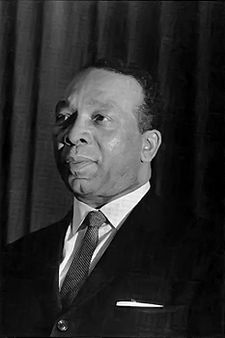 |
January 2, 1975 | January 2, 1979 | Democratic Democratic Party (United States) The Democratic Party is one of two major contemporary political parties in the United States, along with the Republican Party. The party's socially liberal and progressive platform is largely considered center-left in the U.S. political spectrum. The party has the lengthiest record of continuous... |
| 2. | Marion S. Barry, Jr. | 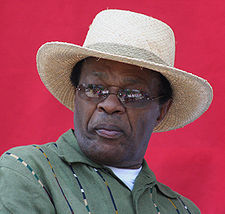 |
January 2, 1979 | January 2, 1991 | Democratic Democratic Party (United States) The Democratic Party is one of two major contemporary political parties in the United States, along with the Republican Party. The party's socially liberal and progressive platform is largely considered center-left in the U.S. political spectrum. The party has the lengthiest record of continuous... |
| 3. | Sharon Pratt Kelly Sharon Pratt Kelly Sharon Pratt Kelly , formerly Sharon Pratt Dixon and now known as Sharon Pratt, was the third mayor of the District of Columbia from 1991 to 1995. Pratt was the first African-American woman to serve as mayor of a major American city... |
January 2, 1991 | January 2, 1995 | Democratic Democratic Party (United States) The Democratic Party is one of two major contemporary political parties in the United States, along with the Republican Party. The party's socially liberal and progressive platform is largely considered center-left in the U.S. political spectrum. The party has the lengthiest record of continuous... |
|
| 4. | Marion S. Barry, Jr. |  |
January 2, 1995 | January 2, 1999 | Democratic Democratic Party (United States) The Democratic Party is one of two major contemporary political parties in the United States, along with the Republican Party. The party's socially liberal and progressive platform is largely considered center-left in the U.S. political spectrum. The party has the lengthiest record of continuous... |
| 5. | Anthony A. Williams Anthony A. Williams Anthony Allen "Tony" Williams is an American politician who served as the fifth mayor of the District of Columbia for two terms, from 1999 to 2007. He had previously served as chief financial officer for the District, managing to balance the budget and achieve a surplus within two years of... |
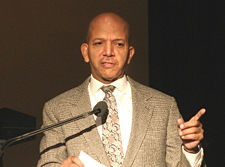 |
January 2, 1999 | January 2, 2007 | Democratic Democratic Party (United States) The Democratic Party is one of two major contemporary political parties in the United States, along with the Republican Party. The party's socially liberal and progressive platform is largely considered center-left in the U.S. political spectrum. The party has the lengthiest record of continuous... |
| 6. | Adrian M. Fenty | 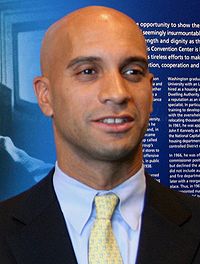 |
January 2, 2007 | January 2, 2011 | Democratic Democratic Party (United States) The Democratic Party is one of two major contemporary political parties in the United States, along with the Republican Party. The party's socially liberal and progressive platform is largely considered center-left in the U.S. political spectrum. The party has the lengthiest record of continuous... |
| 7. | Vincent C. Gray Vincent C. Gray Vincent C. Gray is an American politician who is currently serving as the seventh Mayor of the District of Columbia. Prior to his inauguration as mayor in January 2011, Gray served as Chairman of the Council of the District of Columbia, and as Councilmember for Ward 7... |
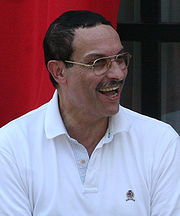 |
January 2, 2011 | Incumbent | Democratic Democratic Party (United States) The Democratic Party is one of two major contemporary political parties in the United States, along with the Republican Party. The party's socially liberal and progressive platform is largely considered center-left in the U.S. political spectrum. The party has the lengthiest record of continuous... |

